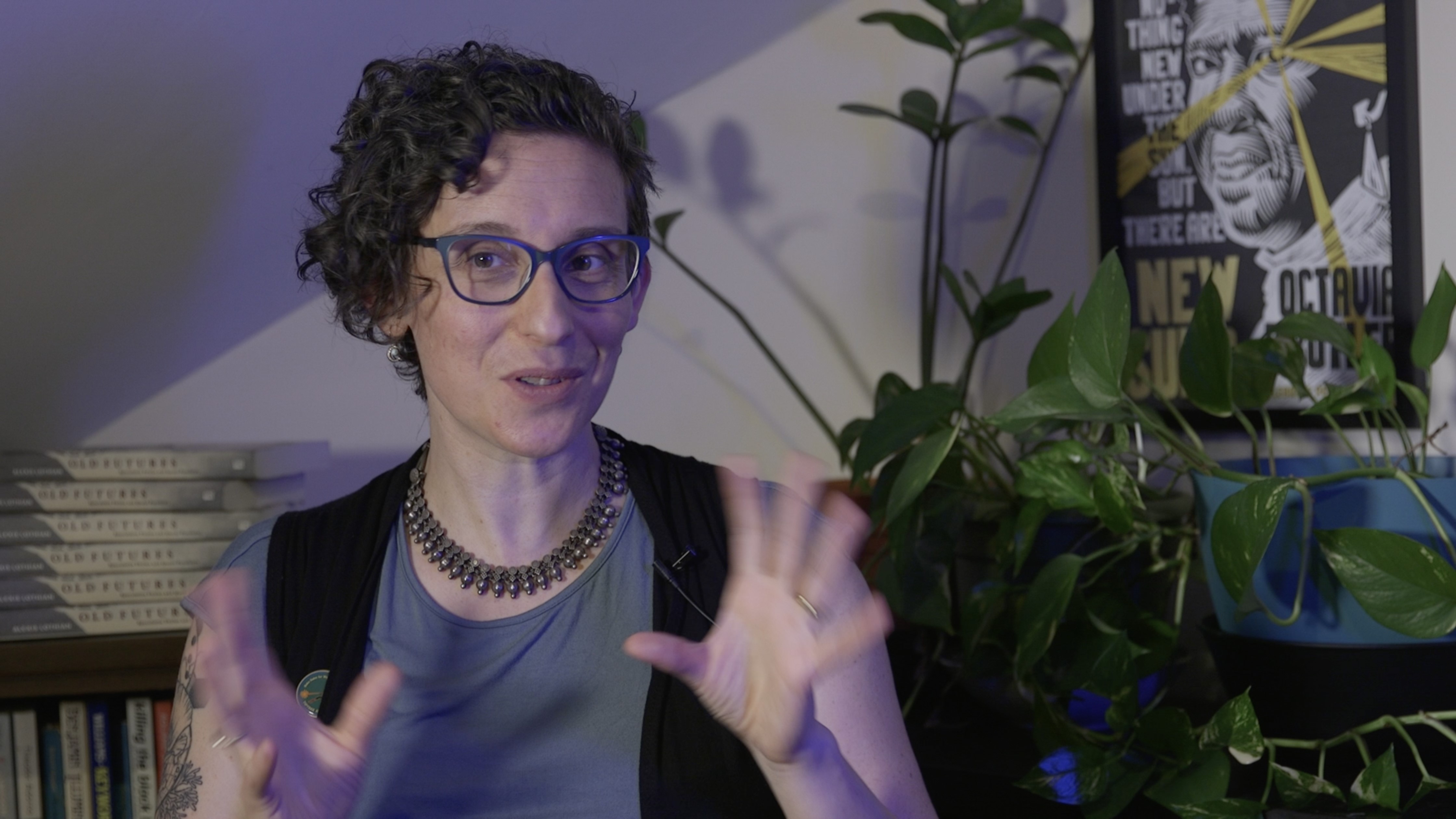Alexis Lothian

Associate Professor, The Harriet Tubman Department of Women, Gender, and Sexuality Studies
Education
Ph.D., , University of Southern California
Research Expertise
Cultural Studies
Digital Studies
Disability
Fandom
Gender
Media Studies
Queer Of Color Critique
Queer Theory
Speculative Fiction
Technology
Television Studies
Trans Studies
Visual Culture
Alexis Lothian is an interdisciplinary scholar of queer and feminist media and cultural studies. Her research centers on speculative fiction, digital media, and online fandom and their relationships to gender, race, and disability justice.
Lothian's first book, Old Futures: Speculative Fiction and Queer Possibility, was published in 2018 by NYU Press. The book explores alternative futures dreamed up by feminists, queers, and people of color in 20th- and 21st-century Britain and America––from feminist utopians to video remixers––in order to inquire into historical and political narratives that the seemingly transparent terminology of “the future” has obscured. As part of this work, she creates video remixes of her own, including “This is a Low: Old Futures in the Age of Brexit,” published in Alienocene: Journal of the First Outernational in 2019. She is currently working on two book projects: a co-authored book on slash fan fiction and the politics of fantasy with Kristina Busse, and a monograph on the formation of critical and social justice-oriented fan cultures in the late 2000s and early 2010s.
Lothian has published extensively on the interconnections between feminist and queer knowledge production and media fans' creative practices, including "An Archive of Whose Own? White Feminism and Racial Justice in Fan Fiction's Digital Infrastructure" (with Mel Stanfill, Transformative Works and Cultures, 2021); “From Transformative Works to #transformDH: Digital Humanities as (Critical) Fandom" (American Quarterly, 2018); “Choose Not To Warn: Trigger Warnings and Content Notes from Fan Culture to Feminist Pedagogy" (Feminist Studies, 2016); “Archival Anarchies: Online Fandom, Subcultural Conservation, and the Transformative Work of Digital Ephemera” (International Journal of Cultural Studies, 2013), and “Living in a Den of Thieves: Fan Video and Digital Challenges to Ownership” (Cinema Journal, 2009).
Lothian co-edits the NYU Press book series Queer/Trans/Digital/Diaspora with Amanda Phillips and Jessica Marie Johnson. She was a founding member of the #transformDH collective and the editorial team for Transformative Works and Cultures, and has served on and chaired the Motherboard of the Otherwise Award, which recognizes speculative fiction that explores and expands understandings of gender.
Publications
An archive of whose own? White feminism and racial justice in fan fiction’s digital infrastructure
Alexis Lothian publishes co-written article on race and feminist data structures in fan fiction
Author/Lead: Alexis LothianNon-ARHU Contributor(s): Mel Stanfill, University of Central Florida
In summer 2020, when the language of racial reckoning entered US and transnational public spheres following the murder of George Floyd, the contradictions of fandom's long-standing claims to progressive politics became sharply visible. An open letter with specific demands asking the fan fiction platform Archive of Our Own (AO3) to address the issue of racist content in the archive circulated widely. After offering a brief history of critiques of fannish racism, we turn to the specifics of AO3, the political commitments embedded in its systems, and how attention to racial justice could transform them. Drawing on fan fiction genres, we offer three potential models for thinking through these possibilities: a fix-it that would extend AO3's existing metadata structures; a canon divergence that would alter the makeup of the content on AO3; and an alternative universe that draws from abolitionist organizing to imagine the broadest structural changes of all.
From Transformative Works to #transformDH: Digital Humanities as Critical Fandom
Alexis Lothian publishes article in American Quarterly's digital humanities special issue
Author/Lead: Alexis LothianDigital humanities is an amorphous and contested field, network, discourse, or discipline. Lothian argues that it is best understood as a fandom—and that there is much to learn from attending to processes and practices of scholarly field formation through lenses developed by fan theorists, practitioners, and scholars. This approach positions digital humanities as operating in excess of institutional logics, treating the affects and conflicts that accompany discussions of digital scholarship as sites of knowledge production in themselves. The article show how the lessons of media fandom's subcultural knowledge production can apply to digital humanities' scholarly networks, calling attention to gendered and racialized power dynamics. Operating both within and in critique of academic digital humanities, the collective movement of #transformDH demonstrates how critical fandom might operate as a methodology for a transformative digital humanities whose goals and ethics do not rely on academic disciplines and institutions.
Old Futures: Speculative Fiction and Queer Possibility
Alexis Lothian's book traverses the history of imagined futures from the 1890s to the 2010s, interweaving speculative visions of gender, race, and sexuality from literature, film, and digital media.
Author/Lead: Alexis Lothian
Narratives of possible futures provide frameworks through which we understand our present, but the discourse of “the” future has never been a singular one. Imagined futures have often been central to the creation and maintenance of imperial domination and technological modernity; Old Futures offers a counterhistory of works that have sought—with varying degrees of success—to speculate otherwise. Examining speculative texts from the 1890s to the 2010s, from Samuel R. Delany to Sense8, Lothian considers the ways in which early feminist utopias and dystopias, Afrofuturist fiction, and queer science fiction media have insisted that the future can and must deviate from dominant narratives of global annihilation or highly restrictive hopes for redemption.

